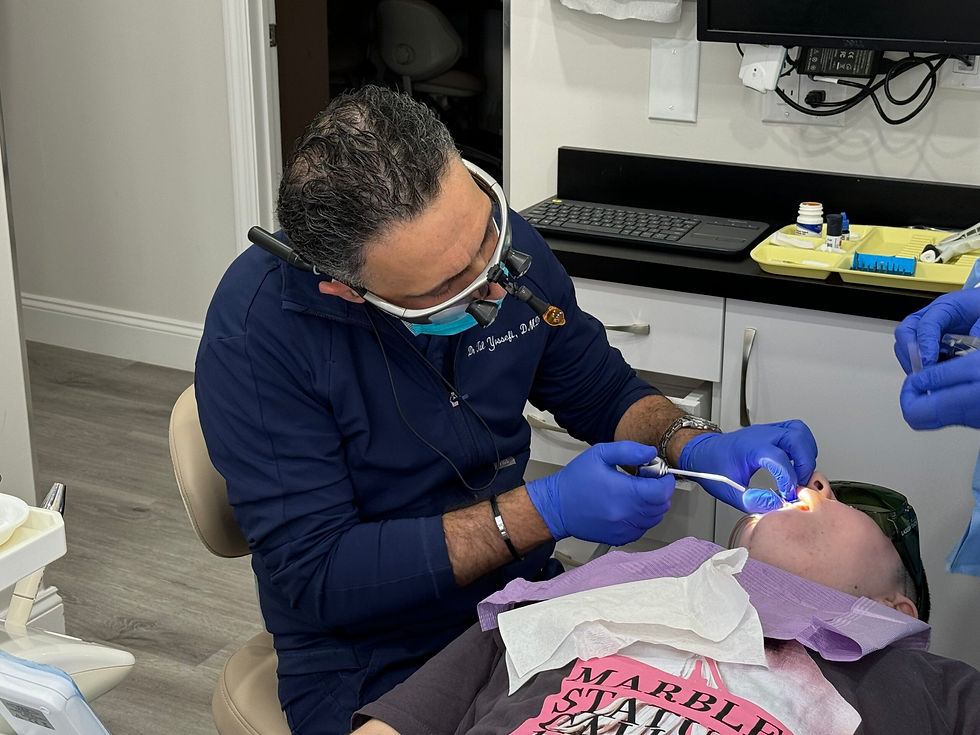Dental Bonding of Front Teeth
- ADC Dentist

- Sep 15, 2020
- 3 min read
Dentistry is divided into sub-specialties, that deals with various types of dental treatments for various age groups such as dentistry related to gums is periodontics, dentistry related to teeth straightening options in orthodontics, dentistry related to the prosthesis is prosthodontics, etc.
Dental bonding is a general treatment that can be done by various sub dental specialties to fix minor to moderate aesthetic issues. Dental bonding is a minimally invasive dental treatment to fix minor cracks, chips, discolored, or minor gaps between the teeth. Such dental issues mainly on the front teeth can be repaired using bonding methods.
Dental Bonding Procedure
Though dental bonding is considered to be a minimal and simple procedure it requires great skills and thorough understanding.
A dental professional will first take a thorough dental and medical history. After that, a thorough clinical and radiographical examination can be done. All these examinations will lay the basis for the diagnosis and treatment planning. The treatment planning will be made according to the needs and requirements of the patients.
If the patient full fills the requirements for the dental bonding treatment, the dentists will then move ahead and proceed with the treatment.
A tooth is then prepared by cleaning and etching the tooth surface depending on the area to be treated. A smear of bonding agent is then applied and bonded to the tooth. This bonding agent acts as a glue between the tooth surface and bonding material. A thin layer of tooth-colored resin-based composite material is then applied to the glued surface and is shaped, curved, and fine-tuned according to the natural shape and structure of the tooth. The bonding light (ultraviolet or laser) is then applied to solidify the material.
Considerations for Dental Bonding for Front Teeth
As stated earlier, dental bonding is usually opted for minor dental issues. If an individual has severe crowding, gaps, cracks, or chips then a dental boning will not be a great option to go with. Perhaps incorporating other dental treatments such as orthodontics, crowns, veneers will be best to have a holistic approach.
Pros and Cons of the Dental Bonding for Front Teeth
Pros:
It is a fast dental procedure that can be done usually in one dental setting.
This procedure improves dental aesthetics to a great level. Good aesthetics in turn improves self-esteem and enhances confidence.
This is a dental procedure that is comfortable and usually requires no anesthesia.
This is a much less expansive procedure as compared to other dental aesthetic treatments.
Cons:
The nature of resin material is porous, so there are great chances of getting stains, and a difference between the natural side and the bonded side can be appreciated.
The lifespan of bonding material is less, as compared to other prostheses such as crowns, veneers, etc.

Home Care
Clinical management as well as home management is crucial for the longevity of dental bonding treatment on the front teeth. Following are some of the home care routines that one must follow to achieve the best results for a longer duration form this dental treatment.
Following and implementing meticulous oral hygiene regimens religiously is basic but the most important. Brushing twice a day with the correct technique in addition to flossing at least once a day is required to keep all the mouth bacteria and plaque-free.
The bacteria anyhow find their way and go in and under the microscopic pores or crack and start destructing the tooth surface. Hence it is crucial to maintain a healthy mouth.
Food containing tannic such as wine, coffee, tea, soda tends to stain the bonded area. Similarly, tobacco products such as cigarettes, alcohol also have staining properties. So it is best to limit and avoid the consumption of such a diet.
Limit the foods that are sticky in nature such as candies.
Avoid eating ice cubes, pens, pencils, or nails, and chewing sticky foods such as candies, to prevent cracks or chipping.
Regular dental visits must be followed twice a year or even if a crack or breakage is noticed.
Do not wait more, schedule your FREE consultation and save your beautiful smile today!
Advanced Dental Center is Norwalk, CT is open from Monday till Friday and on SUNDAYs. Call our office at (203) 364-5084.




Comments